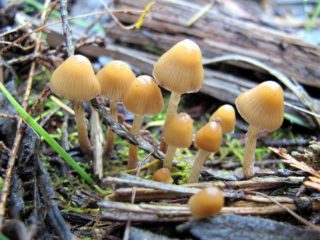Mental health is a constantly trending topic. We’re all looking for ways in which we can support and protect our mental health. Natural substances that can better our mental health have now been pushed to the forefront. However, some of them are quite controversial, most notable psychedelics and cannabis.
In a series called The Business of Health, presented by Longevity and hosted on the Nielsen Network Longevity Live spoke to Calum Hughes, the CEO and Founder of Allied Corp, one of the companies leading the global charge in providing targeted psilocybin and cannabinoid health solutions.
Psychedelics, Cannabis and Mental Health
Psychedelics are a group of substances that alter the user’s mental state, similar to cannabis. While these substances can be made in a lab, they also occur naturally. In fact, one of them has begun to gain traction in the media. The compound is called psilocybin (also referred to as magic mushrooms)and they could be key to addressing a number of mental health disorders.

Photo by Priscilla Du Preez on Unsplash
Allied Corp
According to Hughes, Allied Corp was founded in order to bring natural health and pharmaceutical products to market, in order to help those who have given up their lives to serve their country. The group includes the police, fire service as well as military veterans.
Along with the COO, who also happens to be a military veteran, Hughes has been developing novel genetics. This is in order to help military veterans suffering from post-traumatic issues. Their decade-long work in Canada led them to South America. They soon realized the South American temperate climate offered for both cannabis production and the economic offering for wholesale export to the global community. From there, they acquired a full production site in Colombia which is now fully functional. They are now allowed to sell wholesale products just in the early quarter of 2021.
This is a huge deal. Why? Because there are approximately 700 licenses that have been granted since legalization in Colombia. Out of the 700, approximately 69 were approved for doing their test production of crops. Additionally, there are approximately 12 that have been approved for export, and only about half exported.
The cannabis – psilocybin parallel
“In Canada, with cannabis, the first medical access patient was in 2002 with almost 20 years of legislation, development, and access to medicine.” explains Hughes, “Cannabis is much more evolved, but there are a lot of parallels to what is happening with psilocybin. In Canada. a physician or psychiatrist can apply under Section 56 exemption to prescribe psilocybin and other products to specific disease conditions such as terminally ill, post-traumatic stress, refractory depression, or hard to treat depression, mental health conditions. ”
 In regards to the legalization of psilocybin in the United States, only one state has legalized psilocybin and that’s the state of Oregon,
In regards to the legalization of psilocybin in the United States, only one state has legalized psilocybin and that’s the state of Oregon,
“It’s not like somebody can just walk up to a store and buy this product,” explains Hughes. Rather, psilocybin can only be manufactured and produced under a legal license, and that’s under a drug establishment license. The medicine then gets distributed by the physician under a section 56 exemption. This is where the patient has the appropriate disease indication or malady that matches what the physician directs as an appropriate prescription.
But what about the risk of illegal products?
“I don’t see this developing into a situation where somebody can walk into a corner store or a retail outlet and purchase as much psilocybin as they want.” explains Hughes, “I see this as really needing pharmaceutical, academically-backed research with regular regulator-approved approvals to then enter the market for a very specific disease target or malady, especially in the mental health space.”
Am I going to trip?
“It’s not a large dose where a person has a psychotropic journey,” explains Hughes, “There are organizations that are macro-dosing and the Allied formulation is a macro-dose – there are no psychotropic effects.”
According to Hughes, the macro-dose has the medical efficacy to impact the serotonin pathways. These pathways influence depression, adrenaline, and anxiety, all without causing a psychotropic effect.

Photo by Diego González on Unsplash
Treating PTSD
More often than not, military servicemen and women that come back from their military tour are suffering from post-traumatic stress. Sadly, they will battle with being vulnerable and open. Unfortunately, in order to cope, they resort to self-medicating with alcohol and pain medication.
In regards to the treatment of PTSD, physicians will likely prescribe SSRI – selective serotonin reuptake inhibitor, which basically blocks the reuptake of serotonin, in the space between your neurons in your brain. The buildup then helps to improve your mood. Unfortunately, people can become dependent on these pharmaceutical molecules.
Psilocybin for PTSD
We’re coming out of a global pandemic with COVID-19. So, there’s a lot of people in that mix where, again, you know, self-isolation is a key symptom of, or manifestation of PTSD, where COVID-19 forced us to isolate.
The ramifications of what that posed, there’s going to be a real aftermath from a mental health standpoint, coming out of COVID-19.
About Calum Hughes

Calum Hughes
Calum Hughes is the CEO and Founder of Allied Corp. It is one of the companies leading the global charge in providing targeted psilocybin and cannabinoid health solutions, and psilocybin.
He is a long-term health professional with many years of experience in the medical field from working with a focus on cardiovascular and cerebral vascular rehabilitation. He’s also worked as a director of 140 beds at an acute care hospital, as well as a junk professor at the University of British Colombia.
His area of specialties
-
Health economics
-
Health evaluation
-
Canadian Health services.
-
Health consultants of many projects and sectors for government organizations as well as in the pharmaceutical industry.
-
Clinical experience with working with a clinical health provider, chronic diseases, acute disability, and workplace health and wellness.
Calum is currently working towards a doctorate at Royal Roads University.
Watch the full interview
The video interview contains the full dialogue of this interview, and you can watch it below.





![women [longevity live]](https://longevitylive.com/wp-content/uploads/2020/01/photo-of-women-walking-down-the-street-1116984-100x100.jpg)









